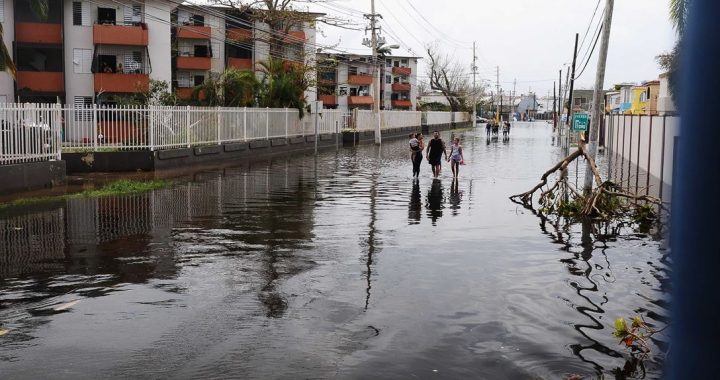By Natasha Lycia Ora Bannan, NLG President
October 30, 2017—These past few months have wreaked havoc on our lives and planet, leaving us to figure out how to respond as ethical citizens and lawyers to some of the most challenging moral dilemmas of our time. I write from Puerto Rico, where the unholy convergence of colonialism, capitalism, and climate change is devastating the island nation and showing us what our future looks like when they collide in the cruelest ways. Almost a month and a half after Hurricane Maria devastated the island as the worst storm it’s seen in a century, 85% of residents and businesses still have no power and most have no running water. Thousands still have no access to potable water, food, or medicine. Finding gasoline is a daily chore for some. Over 40,000 people have left the island, and it’s estimated about 60% of people are unemployed. While this is the reality of Puerto Rico, it’s also the reality for much of the Caribbean after this destructive hurricane season.
These are not just humanitarian crises; they are the products of man-made disasters. Our (lack of) aggressive policies to address the warming of our planet and subsequent climate disasters disproportionately affects the Global South and poor people, who are actually dying because of our refusal to adjust lifestyles. The islands of Barbuda and Antigua will never again exist as they were, as nearly 90% of their economy and structures were destroyed. The floods in Indonesia killed thousands of people this summer who were crushed under mudslides. The wildfires in northern California incinerated homes and land, altering the landscape. Hurricanes Harvey and Irma left thousands in Houston and Florida without homes or medical attention. And this was all within the span of a few weeks.
The added layer of colonialism has surfaced the structural inequalities, racism and imperialism that have existed for centuries. Because Puerto Rico is a colony, it could not receive direct aid from other nearby nations or the U.N. without prior U.S. authorization. A century-old law called the Jones Act prohibits any non-U.S. flagged ship from docking in Puerto Rico to deliver food and goods, including in emergency situations. Puerto Rico imports 85% of its food and the food it did produce was wiped out with the storm, creating a food and water shortage crisis. The U.S. Virgin Islands, which was obliterated by Hurricane Irma, wasn’t even mentioned in coverage of hurricane destruction to the U.S. prior to landing in Florida.
Finally, these disasters have revealed the worst of humanity—disaster capitalism and the pillaging of nations in severe distress. Vulture funds have swooped in to offer loans at abusive rates to ensure their investments remain protected; price gauging for basic necessities has made it impossible for people to feed their children or seek shelter or medical aid elsewhere; politicians have made deals with friends for hefty contracts to continue to rebuild failing systems instead of investing in renewable energy and talk of “restructuring” public services is cover for privatization of them.
This is where the Guild comes in, and where we’re most needed. In the face of overwhelming despair and systemic oppression and eradication, it is imperative that we challenge the corporate and corrupt looting of our communities and defend those who speak out in increasingly creative ways. We are all affected by these disasters, and it will become more and more personal as they reach into every community. Our Environmental Justice Committee has been organizing around these issues—from Haiti to Standing Rock to upstate New York—for years and has supported litigation and legislation addressing energy, food, and climate issues. Our Environmental Justice Committee has helped expand the legal framework around the rights of the planet and connecting movement work by guiding us in legal strategy and thought. And our International Committee’s Indigenous Peoples’ Rights Committee’s work has been key in helping us center native communities who have defended our collective rights and those of the planet for centuries. If you haven’t joined one of these committees yet and are interested, please do now. You are needed more than ever. As Clarisa López, the daughter of Oscar López Rivera, said, “We are all we have.” ■
Photo: Residents of San Juan, Puerto Rico, walking the streets following Hurricane Maria, on September 22. (Source: Dept. of Defense)

